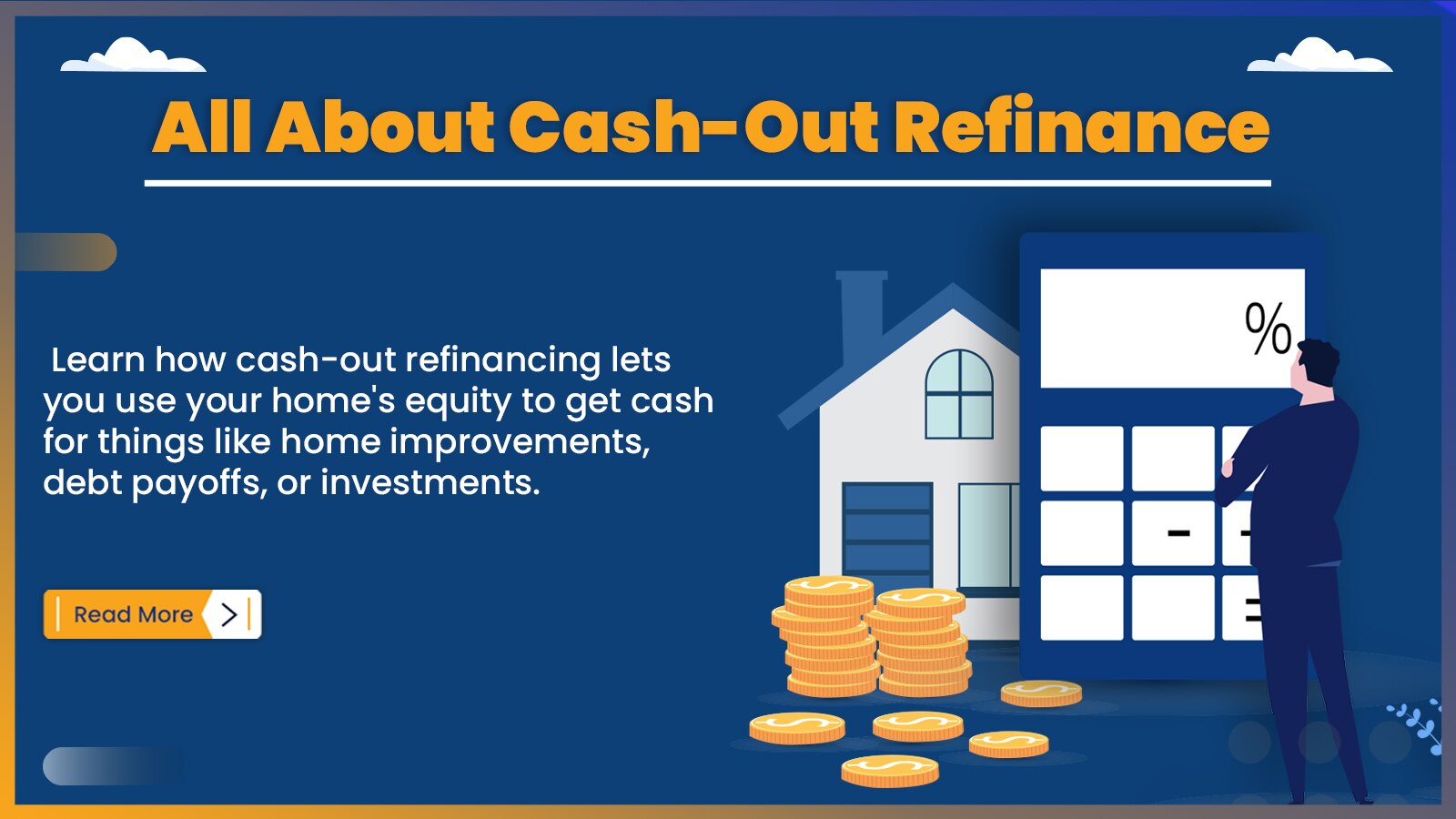
Cash-out refinancing is a way for homeowners to get some money from the value of their home. You take out a new, bigger loan to replace your current one, and you get the extra money in cash. This can help with things like becoming a first home buyer, paying off debt, or fixing up your home. Let’s look at what cash-out refinancing is and how it works.
Understanding Cash-Out Refinance
Cash-out refinancing means getting a new loan that’s more than what you owe on your house now. The extra money you borrow is given to you in cash. You can use this money for things like fixing your home, paying off high-interest debt, paying for school, or investing.
For example, if your home is worth $800,000 and you owe $400,000 on your mortgage, you might get a new loan for $500,000. You’d pay off the $400,000 loan and get $100,000 in cash.
How Does Cash-Out Refinance Work?
Here’s how cash-out refinancing usually works:
- Check Home Value: Find out how much your home is worth by subtracting what you owe from the market value of your home. Lenders usually let you borrow up to 80% of your home’s value, but this can change.
- Apply for the Loan: Talk to your current lender or look for other lenders to get the best deal. You’ll need to give documents like proof of income, credit history, and details about your current mortgage.
- Home Appraisal: The lender will check your home to find out its current market value.
- Approval and Terms: If approved, you’ll get the new loan terms, including the interest rate, repayment period, and any fees.
- Settlement: The new loan pays off your old mortgage, and you get the difference in cash.
Pros and Cons of Cash-Out Refinance
Pros:
- You might get a better interest rate and loan terms.
- You can use the cash to pay off high-interest credit cards and loans.
- Extending the loan term (up to 30 years) can lower your monthly payments.
Cons:
- You might struggle with payments if you can’t keep up.
- A longer loan term means you’ll pay interest for a longer time.
- Closing costs for the new loan can be high, but you can balance this with lower monthly payments if you stay in your home long-term.
- Using cash-out refinance for debt consolidation might extend your loan term more than needed.
Considerations and Risks
Costs and Fees: Refinancing can be expensive, with costs like application fees, valuation fees, legal fees, and sometimes fees for ending your original mortgage early.
Longer Repayment Period: While lower monthly payments are possible, extending your mortgage term means you might pay more interest over the loan’s life.
Impact on Equity: Taking cash out reduces your home equity, which could affect your financial stability and future options, especially if home values drop.
Risk of Missing Payments: If you can’t keep up with payments, you risk falling behind, which could put your home in danger.
Qualification Requirements: Lenders will check your creditworthiness, income, and home value. Poor credit or low income could lead to less favorable loan terms or even rejection.
How Much Can You Borrow with a Cash-Out Refinance?
The amount you can borrow with a cash-out refinance depends on several factors: the current market value of your property, the Loan-to-Value Ratio (LVR) allowed by the lender, and your creditworthiness.
Lenders typically allow a maximum LVR between 80% and 90% of your property’s appraised value. To find out how much you can borrow, calculate the difference between what you owe and 80% of your property’s value.
For example, if your property is appraised at $500,000 and your current mortgage balance is $300,000, a lender allowing an 80% LVR might let you cash out up to $100,000.
Check with lenders for their specific terms and guidelines, as these can vary. They might also have restrictions on how you can use the cash-out funds and require documentation or proof of intended use.
To get an exact amount you’re eligible to borrow, consult with mortgage brokers or lenders. They can assess your situation and give you accurate information based on their criteria.
Benefits of Cash-Out Refinancing
Cash-out refinancing is a smart financial move that lets you tap into your home’s equity. Here are some reasons why it’s popular:
Access to Funds: You get a lump sum of money based on your home’s equity. This can finance projects like home improvements, starting a business, investing, education costs, or paying off high-interest debt.
Competitive Interest Rates: Refinancing often means securing a better interest rate on your loan. Shop around with different lenders to find the best rates and loan terms.
Potential Tax Benefits: Depending on how you use the funds, the interest on the portion of the loan used for investments might be tax-deductible. Consult a tax advisor to understand your specific situation.
Conclusion
Cash-out refinancing is a valuable option for Australian homeowners to access their property’s value for different financial purposes. Whether you want to invest in another property, consolidate debt, or cover major expenses, it’s important to understand how cash-out refinancing operates and its impact.
Ready to Cash-out Refinance? Seek advice from financial expert Nfinity Financials to ensure your decisions match your long-term financial plans. For more, read our related articles or book a consultation call at 1300 GET LOAN today to make informed financial decisions with financial advice.
FAQs
How much can I cash out when I refinance? Typically, lenders limit cash-out refinance amounts to 80% of your home’s value. For example, if your home is valued at $250,000 and your mortgage balance is $150,000, you could cash out up to $50,000.
Can I cash out a refinance to buy another property? Yes, you can use the funds from a cash-out refinance to purchase another property. This strategy is often employed by investors looking to expand their real estate portfolio or by homeowners wishing to buy a second home.
Can I refinance and get cash out? Absolutely. The primary feature of a cash-out refinance is that it allows you to refinance your existing mortgage and access a portion of your home equity as cash. This cash can be used for various purposes, such as home improvements, education expenses, or debt consolidation.
Is a cash-out refinance taxable? The cash received from a cash-out refinance is not considered taxable income. However, if you invest the funds and generate additional income, such as rental income from a new property, that income may be taxable. Consult a tax professional to understand the implications specific to your situation.
How to calculate cash-out refinance? Calculating a cash-out refinance involves determining the amount of equity you can tap into. Typically, lenders allow you to borrow up to 80% of your home’s appraised value. Subtract your existing mortgage balance from this amount to find out how much cash you can potentially receive. For example:
- Appraised home value: $800,000
- Maximum allowable loan (80%): $640,000
- Current mortgage balance: $400,000
- Potential cash-out amount: $240,000 (before closing costs and fees)
Can I cash-out refinance my rental property? Yes, in Australia, you can cash-out refinance your rental property. Lenders typically allow refinancing for investment properties, but terms may vary.
Can you cash-out refinance a car? No, cash-out refinancing is usually for real estate properties, not vehicles in Australia.
Is a home appraisal required? Yes, in most cases, an appraisal determines your home’s market value, crucial for determining how much cash-out you can receive in refinancing.
Does a cash-out refinance change your interest rate? Yes, a cash-out refinance can change your interest rate. It might secure a new rate that’s more competitive or less favorable depending on market conditions and your financial situation.
Does cash-out refinance affect credit score? Yes, applying for a cash-out refinance can temporarily affect your credit score due to the credit inquiry and new loan account. Responsible management can positively impact your credit over time.
Does cash-out refinance increase mortgage payments? Yes, cash-out refinancing could increase your mortgage payment if you borrow more or extend your loan term. Consider the impact on your monthly budget.
How long does a refinance cash-out take? Similar to a regular refinance, the timeframe for a cash-out refinance in Australia varies but generally involves a process that can take weeks from application to settlement.
Cash-out refinance vs. home equity loan: What’s the difference? Both allow accessing equity but differ in process. Cash-out refinancing replaces your original mortgage with a new one, while a home equity loan adds a new loan without changing your original mortgage.







